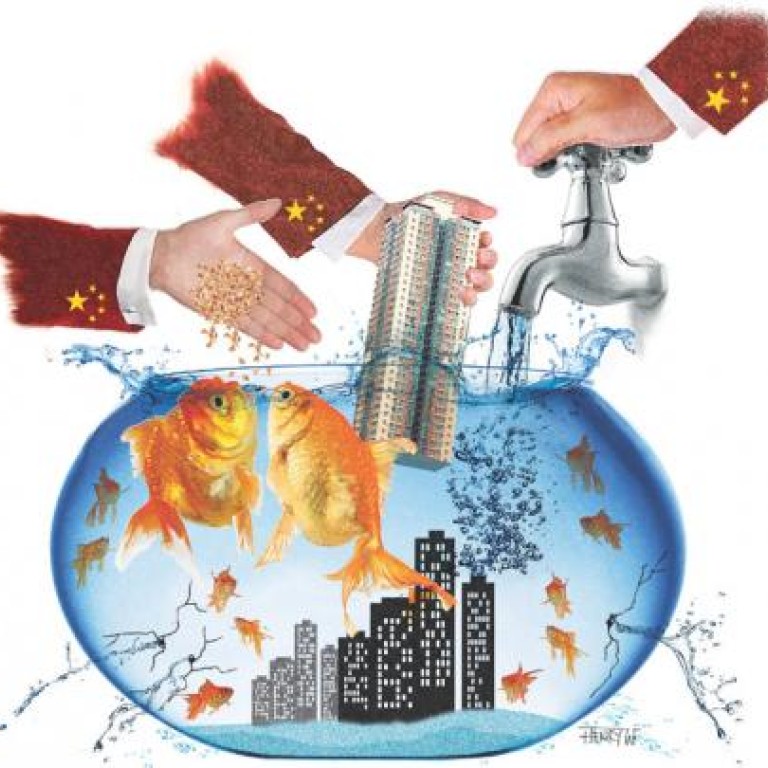
Crash diet needed for China's binge spending
Andy Xie says China's government sector has become morbidly obese from its spending addiction. Its new leaders will need to consider a radical intervention to avoid a crisis
China's Communist Party has set in motion a generational leadership change, raising hopes for policy changes after the transition to revive the economy. Many people pin their hopes on another vast stimulus like the one of 2008. I doubt that would help. China's economic problems are structural and difficult to fix. To stabilise the situation, the new leaders must stop the government from growing.
Over the past decade, China's government has become obese, crowding out everyone else, and feeding the twin evils - corruption and speculation - that plague the economy. Government actions drive most economic activities, and they are mostly inefficient. The current economic downturn is a consequence of the massive capital misallocation due to government's excessive intervention in the economy. An attempt to revive the economy through more wasteful investment will push the country closer to financial crises and currency devaluation.
China must instead put the government on an emergency diet. Any stimulus must be made through tax cuts to boost household spending and alleviate the tax burden on private enterprises.
Last year, the government reported fiscal revenue that reached 22 per cent of gross domestic product; the figure came up to 35 per cent if government-managed social funds such as social security were added. The largely debt-funded fixed-asset investment by the government and state-owned enterprises reached 22 per cent of GDP; property sales, with most of the proceeds going to the government, 13 per cent of GDP; and land sales that all go to the government, 6 per cent. While these numbers overlap to some degree, they portray an economy in which the government dominates spending.
Net fund-raising, mostly for state-owned enterprises, property companies and local governments, is running at 30 per cent of GDP so far in the current year. Total reported corporate profit, though declining, is above 10 per cent of GDP. And fiscal revenue is rising faster than GDP.
But what has this large amount of fixed-asset investment achieved? Electricity production has grown by less than 4 per cent so far this year, compared with an average of 12 per cent per year for the past decade. Most retailers report revenues rising in the mid-single digits. Excluding inflation, that growth would be close to zero. Based on production data and corporate reports, China's economy seems to be barely growing.
Most local governments and state-owned enterprises blame policy tightening for the downturn. But the money available to them speaks otherwise. They feel that money is tight because their spending appetite has grown. Also, because most projects are not profitable, how can banks justify more loans?
The perception of tightening is the result of a vast property bubble bursting. Most government officials and developers blame government policy for the market downturn. But most property is being built in third-tier cities where there are no sales restrictions, and sales there have collapsed. Overbuilding is the main factor. These cities see little population growth, yet are building to double or even triple their size. How could the market not collapse? At least 50 million flats are under construction on the mainland, and there are perhaps 20 million more empty ones in the housing stock. This mindless overbuilding is driven by local governments that view property as their ATM.
Overcapacity is another consequence of the investment madness afflicting the mandarins. The solar power panel industry is bankrupt. So is shipbuilding. Steel, cement, paper, cars and other industries all face crushing overcapacity that destroys profitability. To maximise GDP, local governments are using revenue from the property sector to subsidise manufacturing investment, using one bubble to fund another. It takes years to whittle down overcapacity. In the meantime, the banking system will suffer grave damage.
China's economy has become a game for the mandarins. Their voices weigh disproportionately on national policymaking. They of course advocate printing more money to feed their spending habits. Such blind spending, if left unchecked, will drive the economy towards hyperinflation, financial crisis and currency devaluation. Such consequences would be fatal to political stability. The new leaders must hold off the printing press and put the mandarins on an emergency diet.
But the effect of dieting is only temporary. Only a change in lifestyle can maintain weight loss. China must reform government and privatise state-owned enterprises to prevent further spending binges.
First, China's should cut its five levels of governments to three. Modern information technology has rendered China's imperial bureaucracy obsolete. In China, the more government officials, the less efficient the economy.
Second, local governments should be audited by independent accounting firms, just like listed companies. They borrow and spend through affiliated businesses. This is why local governments have run up more than 10 trillion yuan (HK$12.3 trillion) in debt, even though most have no right to raise debt. Stopping local governments from raising debt is a vital step to national financial stability.
Third, state-owned enterprises under the central government have become too big to manage. They depend on loans to stay afloat. Such businesses inevitably become involved in politics to secure their survival. The government must break up these too-big-to-manage entities.
There is no quick fix for the incoming leadership. The economic downturn is not the biggest challenge. Their first job is to stop the rot from spreading. But it will take years to get to the root of the problem and fix the system.
Doing nothing, however, is not an option. The rot in China's system grows on its own without a countervailing force - at present, the top leadership is the only one. If the new leaders choose not to make hard decisions in the name of stability, the system will become truly unstable.

